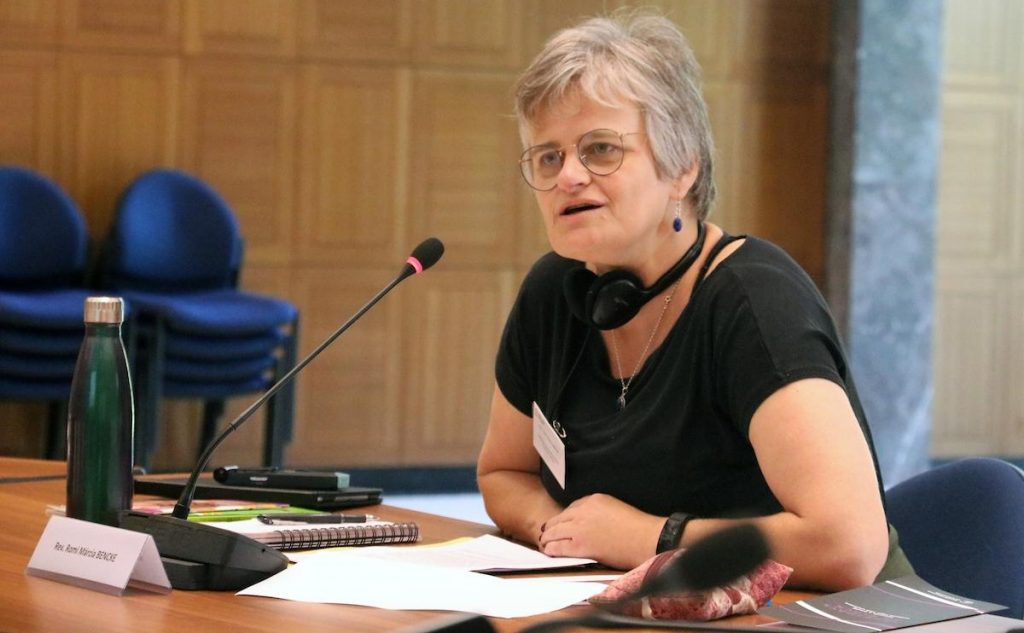
WCC-Rev. Romi Bencke, general secretary of the National Council of Christian Churches of Brazil, believes that being an ecumenical leader means having the courage to ask the most difficult questions even in a polarized society.
As the 2021 Ecumenical Fraternity Campaign continues in Brazil despite being vociferously attacked by opposing groups, Bencke recalls early discussions that decided the theme for the campaign. Those talks, held within churches and communities, involved stark and honest descriptions of the current polarization in Brazilian society.
Bencke and the ecumenical planning group chose as the theme: “Fraternity and dialogue: commitment of love.” Not only is dialogue a way of overcoming polarization—Bencke also believes it is a genuine Christian response in times of divisiveness.
“Authentic dialogue is what we learn from Jesus Christ, who spoke with women, teachers of the law, tax collectors,” Bencke said. “The entire Ecumenical Fraternity Campaign has a biblical motto that illuminates the reality we are talking about.”
The campaign, which has been carried out ecumenically on average every five years since 2000, hinges this year around Ephesians 2:14, which reads: “Christ is our peace: he has made both groups into one and has broken down the dividing wall.”
In the community of Ephesus, there was polarization between Jews and Gentiles but, in Jesus, the walls of the division had been broken down.
Working against division and polarization may seem laudable—or at least innocuous—in many settings, however, the Ecumenical Fraternity Campaign has drawn harsh criticism from fundamentalist groups that feel threatened by the call to unity. They question what they term “modernist” or “revolutionary” values, including overcoming structural racism, preventing gender-based discrimination and violence, and addressing the climate emergency.
“Another aspect that they criticize in the study text of the campaign is the fact that we defend that indigenous peoples should have the right to worship their sacred and that they should not be the target of proselytizing missions,” said Bencke. “They also criticize the gestures of solidarity that ecumenical Christian groups carried out in favor of Afro-religious traditions, the target of attacks and persecution by extremist Christian groups.”
Bencke believes that, at its heart, the Ecumenical Fraternity Campaign is an ecumenical expression of unity in diversity in compassion for the vulnerable “This means recognizing the other person and also creation as an expression of God’s unconditional love,” she said. “Brazil has decades of ecumenical experiences.”
The impacts of the ecumenical movement on Brazilian society are many, she added. “We can highlight all the contributions to the democratic opening of the country and to the affirmation of the religious diversity that is inherent to Brazil,” she said.
Despite the criticism, Bencke stands strongly in her belief that it’s worth asking a tough question: “Which are the walls that divide us both in the churches and in society?”
The Ecumenical Fraternity Campaign tries to name racism, LGBTQIA + phobia, feminicide, climate change, economic inequality, religious fundamentalism, denialism, attacks on international organizations such as the UN and WHO, absence of empathy and solidarity, and the persecution of defending people human rights. “All of these themes are agendas of the ecumenical movement whose ultimate horizon is the culture of peace,” she said. “For peace to be concrete, these walls need to be broken down.”
Christian people need to talk about what divides them as Christians and as societies, urged Bencke. “There is no hope of unity in diversity in a society that understands dialogue as something to be attacked,” she said.
